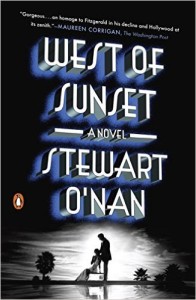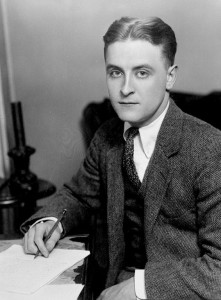West of Sunset Book Review
 4/7/16 — Stewart O’Nan’s Novel Take on F. Scott Fitzgerald
4/7/16 — Stewart O’Nan’s Novel Take on F. Scott Fitzgerald
It takes a lot of courage for an author to write a fictional book about a writer who’s almost as famous for his life as for his novels. Stewart O’Nan meets the challenge with West of Sunset, a novel about F. Scott Fitzgerald. In O’Nan’s imaginings we’re shown a depth, intelligence, and artistic struggle that meshes beautifully with the outlines of Fitzgerald’s life that his fans know so well.
The 2015 novel is a fictionalized account of the last three years of the famous author’s life. In the opening chapter, the forty-year-old Fitzgerald is no longer the golden boy of the literary set. In poor health and financially strapped, he’s about to leave the East Coast for Hollywood to work as a script-writing hack for MGM. His wife, Zelda, is in a sanatorium in North Carolina, their daughter, Scottie, is in a boarding school in New Jersey, and Fitzgerald feels he has no choice but to compromise his talents so he can pay the bills.
The sensational highs are behind him — from This Side of Paradise in 1919, The Beautiful and the Damned in 1922, and The Great Gatsby three years later. Hard times came with the lukewarm reception for Tender Is the Night, his alcoholism, and Zelda’s mental illness.
Readers grasp the depth of Fitzgerald’s fall in O’Nan’s description of his arrival in Hollywood in 1937, for his third visit:
“The first time, he’d entered the city triumphant, the golden wunderkind and his flapper bride, signing autographs and mugging with Zelda for the cameras …. The last, after the Crash, she was recovering in Montgomery, and he got off at Pasadena to avoid the reporters. Now as he stepped down onto the platform there was no one to greet him. He gathered his bags, flagged a cab and disappeared into traffic.”
O’Nan uses a close third-person narration to take us inside Fitzgerald’s mind during the three tumultuous years, 1937 to 1940. It’s a clever technique that keeps the reader from questioning Fitzgerald’s voice while emphasizing his position as an outsider — a man without a home, a permanent job, financial security, health, or self-confidence.
On his first day at work he learns about the script he’ll be given to doctor, we read:
“As Eddie spun out the story line, [Fitzgerald] smiled and nodded at the right places, chiming in with prescient questions so as not to seem too ingratiating, with the result that, as happened so often now, he felt utterly false, and, though it was his own doing, used.
‘It doesn’t matter what you write for [Joseph] Mankiewicz,’ Oppy said. ‘He’ll make it about the girl.’
‘And slap a happy ending on it,’ Dottie said.
‘Leave ‘em laughing about Hitler,’ Benchley said.
‘Mank’s like Jane Austen,’ Alan [Parker’s husband] said. ‘It could be Hitler, Franco and Mussolini. By the end they’re all getting married.’”
Fitzgerald plays along but his heart isn’t in it. He’d come to Hollywood to redeem his failures and thought he’d done a good job. Instead, the studio rejected his scripts or passed them on to second-rate writers.
O’Nan shows a shattered man who is struggling to thrive in a world that is disintegrating around him. He rises before dawn each morning to devote himself to writing a novel that Fitzgerald readers know will become The Last Tycoon. Later, during the workday, he perseveres in his studio office, trying to salvage plays that will please the studio and make artistic sense to him.
Far from his wife and daughter, he writes to each of them regularly. Thoughts of Zelda torment him. Once passionately in love with her, he now feels mainly an obligation to her — to keep her safe and untroubled. He hides from her any knowledge of his torrid affair with Sheilah Grahame, a gossip columnist who bears a physical resemblance to Zelda.
He tries to hide from everyone his constant battles with alcohol. Frequently Grahame comes to the rescue after he’s been beaten in a drunken brawl or fallen ill. As his relationship with Grahame grows, he worries that he is becoming for her what Zelda has become for him — an obligation. In O’Nan’s hands, Fitzgerald is tormented and striving, deflated and persevering, hopeful until the end.
Some readers may have an antipathy to books that fictionalize real people. A writer as talented as O’Nan could certainly have told the story of a down-on-his-heels writer John Doe, but that book would have been different. It would have missed out on one layer of interest in West of Sunset — the similarity between O’Nan’s Fitzgerald and author Fitzgerald’s own characters. That adds a dimension that a John Doe could never have given this book.
Comparisons are inevitable. O’Nan is not Fitzgerald, but O’Nan is a fine writer who tells an engaging, entertaining, and thoughtful story.
Janet Willen
Janet Willen is author of Speak a Word for Freedom: Women against Slavery (2015) and Five Thousand Years of Slavery (2011), written with Marjorie Gann and published by Tundra Books. Publishers Weekly called Speak a Word for Freedom an “engrossing study of female abolitionists from the 18th century to the present day” and gave the book a starred review. Five Thousand Years of Slavery was named a 2012 Notable Book for a Global Society by the International Reading Association and a Silver Winner in young adult nonfiction of ForeWord Reviews, and it received a starred review from School Library Journal. A writer and editor for more than thirty years, Janet has written many magazine articles and has edited books for elementary school children as well as academic texts and a remedial writing curriculum for postsecondary students. Janet lives in Silver Spring, Maryland.
